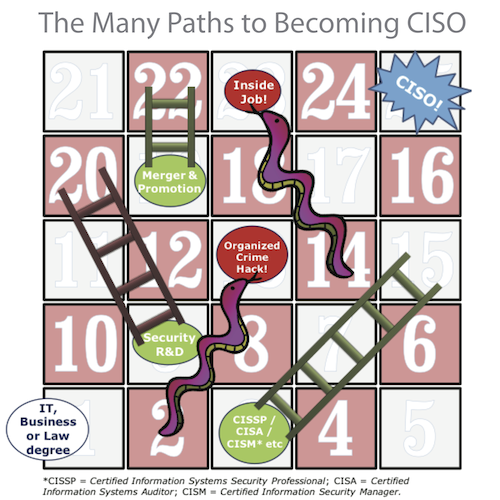The Future of the Security Industry and Career Advice for Chief Information Security Officers
 Over the years, we security professionals have tried all sorts of things to make better connections with other parts of the business. We have broadened our qualifications, developed new Return on Security Investment tools, preached that security is a "business enabler", and strived to talk about solutions and not boring old technologies. But we've had mixed success.
Over the years, we security professionals have tried all sorts of things to make better connections with other parts of the business. We have broadened our qualifications, developed new Return on Security Investment tools, preached that security is a "business enabler", and strived to talk about solutions and not boring old technologies. But we've had mixed success.
Once when I worked as a principal consultant for a large security services provider, a new sales VP came in to the company with a fresh approach. She was convinced that the customer conversation had to switch from technical security to something more meaningful to the wider business: Risk Management. For several months after that I joined call after call with our sales teams, all to no avail. We weren't improving our lead conversions; in fact with banks we seemed to be going backwards. And then it dawned on me: there isn't much anyone can tell bankers about risk they don't already know.
Joining the worlds of security and business is easier said than done. So what is the best way for security line managers to engage with their peers? How can they truly contribute to new business instead of being limited to protecting old business? In a new investigation I've done at Constellation Research I've been looking at how classical security analysis skills and tools can be leveraged for strategic information management.
Remember that the classical frame for managing security is "Confidentiality-Integrity-Availability" or C-I-A. This is how we conventionally look at defending enterprise information assets; threats to security are seen in terms of how critical data may be exposed to unauthorised access, or lost, damaged or stolen, or otherwise made inaccessible to legitimate users. The stock-in-trade for the Chief Information Security Officer (CISO) is the enterprise information asset register and the continuous exercise of Threat & Risk Assessment around those assets.
I suggest that this way of looking at assets can be extended, shifting from a defensive mindset to a strategic, forward outlook. When the CISO has developed a birds-eye view of their organisation's information assets, they are ideally positioned to map the value of the assets more completely. What is it that makes information valuable exactly? It depends on the business - and security professionals are very good at looking at context. So for example, in financial services or technology, companies can compete on the basis of their original research, so it's the lead time to discovery that sets them apart. On the other hand, in healthcare and retail, the completeness of customer records is a critical differentiator for it allows better quality relationships to be created. And when dealing with sensitive personal information, as in the travel and hospitality industry, the consent and permissions attached to data records determine how they may be leveraged for new business. These are the sorts of things that make different data valuable in different contexts.
CISOs are trained to look at data through different prisms and to assess data in different dimensions. I've found that CISOs are therefore ideally qualified to bring a fresh approach to building the value of enterprise information assets. They can take a more pro-active role in information management, and carve out a new strategic place for themselves in the C-suite.
My new report, "Strategic Opportunities for the CISO", is available now.



